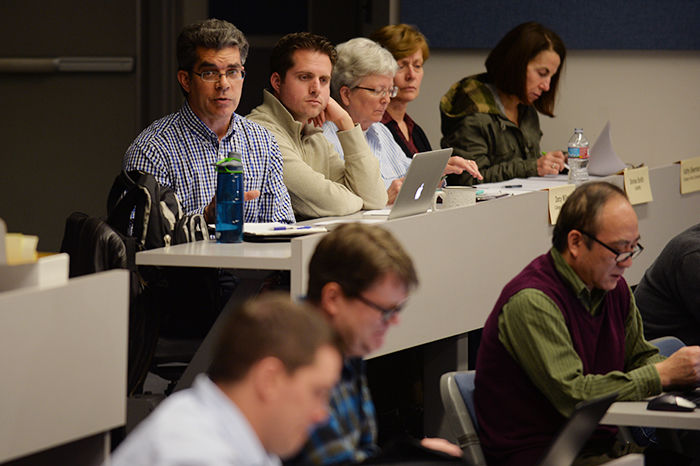Tenure and non-tenure faculty need protection
Desmond Layne discusses the extension of the organic agriculture systems degree to WSU-Everett during a Faculty Senate meeting on Thursday.
February 28, 2017
The quality of a free and civilized country can be judged by the freedom its academics and intellectual elite have to pursue bold new lines of inquiry. In the United States, that quality has been falling for some time.
In 2013, Jordan Weissmann of The Atlantic reported tenure and tenure-track faculty have fallen from 45 percent of university faculties on average to less than 25 percent. Part-time faculty make up 40 percent of the population of university instructors.
“Once, being a college professor was a career,” Weissmann wrote. “Today, it’s a gig.”
Tenure was once the goal of any new academic. It offered sublime sanctuary, the professional protection that allowed professors of all disciplines to revolutionarily and courageously research and write. Tenure can be subject to abuse, but undisciplined missteps by tenured faculty could be as much a matter of university transparency as tenure itself.
There is a catch, however: take those positions away, and the remaining untenured faculty lack those same protections of academic freedom. On average, tenure is becoming less of a guarantee.
Then, the remaining solution is for untenured, or non-tenured, and adjunct faculty to collectivize either through shared governance of the university with the administration or through unionization.
Presently, shared governance at WSU exists in the form of the Faculty Senate. This body’s approval is required for many elements of academic life, such as standards of admission and scholarship, as enumerated in its constitution.
A. G. Rud, chair of the Faculty Senate, noted in an email that unions tend to breed adversarial relationships as compared to shared governance.
History also demonstrates this adversarial relationship between unions and administration. Indeed, one could argue unions are intended to be adversarial in order to accomplish their goals.
Despite room for disharmony, a more adversarial relationship might offer better results and protections for untenured track faculty. The justification is simple: administration focuses on product and brand value, whereas faculties concentrate on teaching and research, often irrespective of perceived monetary value.
“There is so much pressure to get external funding that academic freedom is often sacrificed to the demands of industry,” WSU professor of English Donna Potts said. “My feeling is that everyone who teaches and does research should have academic freedom.”
Potts also represents the WSU advocacy chapter of the American Association of University Professors (AAUP), the umbrella union for university faculty.
“The reason faculty are often disempowered is because they focus on their discipline and forget their obligation to their professional organization, which means that the AAUP has fewer resources to defend faculty,” Potts said.
The great challenge of any unionization will be overcoming the divisions between tenured and untenured faculty. Any collectivization should be made in the spirit of solidarity between tenured faculty, untenured faculty and even graduate students.
The Faculty Senate, through no fault of its own, operates as any representative democracy: it exists on the premise of trusteeship. In other words, it functions based on faculty trusting in their representatives to defend their interests adequately. This is true whether faculty choose to vote for these senators or not. Despite the best of intentions, the interests of everyone do not always get defended.
Moreover, the institution of tenure is not just being scaled back but dissolved entirely in some states. Joshua Krisch in a Jan. 17 article for The Scientist described legislative threats to public university tenure in Missouri and Iowa.
“The legislation in Missouri would end tenure for all new hires as of 2018,” Krisch wrote. “The Iowa bill … would retroactively take tenure away, including from current professors.”
Given the political and economic pressure threatening tenure positions, faculty collectivization might become even more necessary. In the interest of academic freedom and creativity, all faculty positions should come with guaranteed protection. For many present and future faculty, unionization might be the only solution.
Tyler Laferriere is a graduate student pursuing his master’s in economics from Phoenix, Arizona. He can be contacted at 335-2290 or by [email protected]. The opinions expressed in this column are not necessarily those of the staff of The Daily Evergreen or those of The Office of Student Media.
Editor’s note: The caption for this column’s photo has been revised to reflect that Desmond Layne was discussing the extension of the organic agriculture systems degree to WSU-Everett, not the SAT scores of admitted students.






















